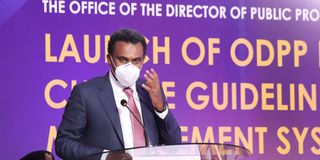Haji’s office issues new rules for prosecutors on preferring charges

What you need to know:
- Under the first test, prosecutors will have to ascertain the strength of the evidence.
- They will only pursue cases with realistic prospects of conviction.
- Under the second test, they will consider the culpability of the suspect.
The Office of the Director of Public Prosecutions (ODPP) has issued new guidelines that prosecutors will now be expected to use to decide whether or not to prefer charges against suspects in corruption and other criminal cases.
The new rules outline the thresholds that prosecutors must check to see if the potential case either passes the evidence test, the public interest test, or both.
Under the first test, prosecutors will have to ascertain the strength of the evidence and only pursue cases with realistic prospects of conviction.
Under the second test, they will consider the culpability of the suspect, as well as the impact or harm to the community, the suspect’s age at the time of the offence and whether prosecution is a proportionate response.
LEGITIMACY OF DECISIONS
Speaking during the launch of the guidelines Tuesday, Chief Justice David Maraga said they are an important step towards giving legitimacy to the use of prosecutorial powers.
“The guidelines provide a basis and gauge against which the legitimacy of decisions taken can be measured,” said Mr Maraga.
While noting that the decision to charge is the most significant a prosecutor makes in the handling of criminal cases, DPP Noordin Haji said it entails considerable discretion on the part of the prosecutor and the decision, therefore, must be founded in law.
“It also must serve the public interest, ingrain fair administration of justice and avoid abuse of the legal process,” he said.
KEENLY STUDY GUIDELINES
Noting that a working judicial system is vital to the work done by officers in his ministry, Interior Cabinet Secretary Fred Matiang’i called on the National Police Service to keenly study the guidelines.
“Over the past two years, we have seen a significant reduction of prisoners in remand as a result of the guidelines given by the ODPP and the judiciary,” said Dr Matiang’i. Also launched was the country’s first digital case management system dubbed “Uadilifu”.
Mr Maraga said the system, which has already been integrated with the judiciary’s e-filing system that was launched at the beginning of the month, promises to eliminate long-standing problems in the justice system, including missing files, delays, lack of accountability and lack of transparency.
Mr Haji said the system has capabilities that enable the tracking and monitoring of the status and progress of files and, furthermore, facilitate electronic filing of pleadings and disclosure of evidential material.
INTEGRATE INSTITUTIONS
Ultimately, the desire is that all the institutions involved in the administration of justice, including those that exercise delegated prosecution, get integrated into the system.
The Independent Policing Oversight Authority (IPOA) is currently on its first level of integration as the Ethics and Anti-Corruption Commission works on automating its own system.
Inspector General of police Hillary Mutyambai said the process of digitising police records was ongoing.





